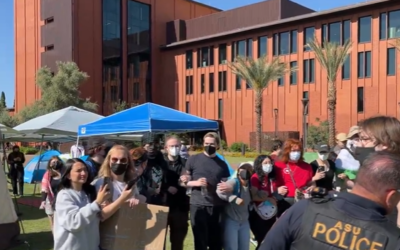By Corinne Murdock |
Plans by state and local leadership to establish Arizona as a leader in semiconductor manufacturing have stalled due to a lack of skilled workers.
Taiwan Semiconductor Manufacturing Company (TSMC) announced last week that it will delay production until 2025: a full year after their initially planned launch. TSMC produces 90 percent of the world’s microchips, supplying major products like Apple’s iPhone, iPad, and Mac computers.
TSMC Chair Mark Liu indicated in last week’s second quarter earnings call that efforts on their end to gin up an adequate workforce couldn’t counter the limited talent pool in the country.
“We are encountering certain challenges, as there is an insufficient amount of skilled workers with those specialized expertise required for equipment installation in a semiconductor-grade facility,” said Liu. “While we are working to improve the situation, including sending experienced technicians from Taiwan to train the local skilled workers for a short period of time, we expect the production schedule of N4 process technology to be pushed out to 2025.”
Maricopa County Community Colleges (MCCC) partnered with Intel to launch a program last year to supplement the burgeoning semiconductor industry’s workforce, estimated to be around 3,000 workers between Intel and TSMC. Students who pass certification receive a $270 stipend to cover the tuition cost.
TSMC raised their investment in the state from $12 billion to $40 billion ahead of President Joe Biden’s visit to tour the Phoenix facility last year.
Biden’s TSMC appearance marked his first and only trip to the state during his entire presidency — even with the ongoing border crisis. Biden justified prioritization of a manufacturing facility over the border crisis by claiming the border wasn’t important.
Biden’s first and, so far, only interest in visiting Arizona may align with his consistent desire to prioritize business and personal interests over national interests (as reflected by his alleged involvement in the laptop debacle revealing corrupt foreign business dealings by his son, Hunter Biden). Biden said during his TSMC speech that he “owe[s] an awful lot” to TSMC because the wife of its founder, Morris Chang, worked his first Senate campaign.
Phoenix Mayor Kate Gallego also has ties to TSMC. Gallego’s former senior policy advisor and campaign donor, Laura Franco French, serves as TSMC’s director of state government relations. Franco French joined TSMC in 2021 immediately after departing Gallego’s office, where she’d served since Gallego became mayor in 2019.
Gallego’s TSMC connection may explain her apparent lack of concern with TSMC’s delay. When asked about the TSMC issue with obtaining skilled workers during an interview on Sunday, Gallego responded with a non-answer.
“We are very excited to be the future of semiconductors. It’s so important that we’re onshoring manufacturing of these essential devices in the United States and we’re going to take an all-hands-on deck approach to make sure it is successful,” said Gallego. “President Biden has picked Phoenix as one of the innovation job hubs and will be able to partner with the US Department of Commerce in particular, but across his administration to do training for our residents. We have a very successful project with our community college where people can get a six-week certificate in semiconductors that’s produced hundreds of graduates so far, but we know we have to turn it up so that we can deliver not just for Arizona but for the world.”
In addition to the shortage of skilled workers, TSMC’s development in Arizona may be delayed due to other concerns with health and environmental impact.
Perfluoroalkyl and polyfluoroalkyl substances (PFAS) — dubbed “forever chemicals” for their resistance to breaking down — are integral to microchip production. PFAS have been linked to a host of serious health issues concerning fertility, fetal development, bone variations, behavioral changes, accelerated puberty, high blood pressure, liver disease, cancer, lowered immunity, hormone disruption, thyroid disease, high cholesterol, and obesity. Chemical waste from factory production has led to PFAS contaminating water and, consequently, humans and the environment.
The Biden administration has progressively focused on PFAS with increasing pressure. Last June, the Environmental Protection Agency (EPA) issued four drinking water health advisories for PFAS. Last August, the EPA proposed designating two of the most widely used PFAS as hazardous substances. Last December, the EPA required facilities to report on all PFAS usage. In March, the EPA issued its first-ever proposal to regulate PFAS in drinking water.
READ MORE EPA ACTIONS ADDRESSING PFAS
The Biden administration has offered $3 billion in grants to states and territories to clean up PFAS in drinking water; it also launched an analytics tool for the public to track PFAS contamination.
3M announced in December that it would halt PFAs production by 2025, a move which set off alarm bells for TSMC and other chipmakers. The announcement came ahead of the company’s $10.5 to $12.5 billion settlement for drinking water contamination.
Corinne Murdock is a reporter for AZ Free News. Follow her latest on Twitter, or email tips to corinne@azfreenews.com.







